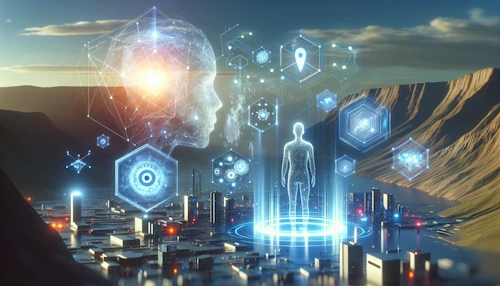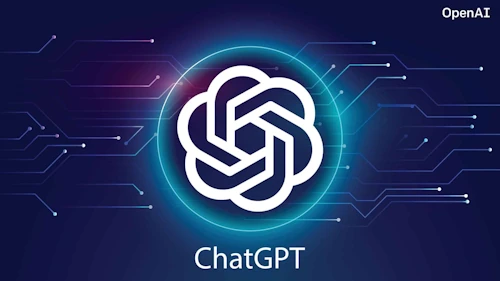
As we continue to navigate the digital age, the future of artificial intelligence (AI) holds immense potential. With advancements in technology, particularly in generative models like OpenAI’s ChatGPT, the next few years are poised to witness a revolution in multiple industries. ChatGPT, with its ability to generate human-like text, is set to change the way we live and work. This article delves into the future of AI, exploring the impact and implications of ChatGPT. It also delves into the benefits and challenges that lie ahead, as we embrace this groundbreaking technology and adapt to the ever-evolving landscape of AI.
Section 1: Understanding AI and ChatGPT
What is AI?
AI, which stands for Artificial Intelligence, is a fascinating field within computer science that focuses on creating machines and computers capable of imitating human intelligence and problem-solving skills. By harnessing the power of AI technology, whether on its own or in conjunction with other cutting-edge technologies such as sensors and robotics, we can witness the remarkable ability of machines to carry out tasks that traditionally necessitate human intelligence or intervention. This groundbreaking field has revolutionized the way we approach problem-solving and has opened up a world of possibilities for automation and efficiency.
Introduction to ChatGPT
ChatGPT, developed by OpenAI, represents an exceptional demonstration of the remarkable capabilities of artificial intelligence. This sophisticated chatbot employs state-of-the-art generative AI technology to facilitate natural language processing. Consequently, it is capable of engaging in interactive conversations with users, providing informative responses to inquiries and offering assistance in a variety of tasks, including composing emails and even generating code. ChatGPT exemplifies the remarkable potential of AI in enhancing human-computer interactions.
Section 2: The Evolution of AI and the Rise of Generative Models
AI has come a long way since its inception. From the first documented success of an AI computer program in 1951 to the creation of IBM’s Deep Blue and Watson, AI has made significant strides. The advent of generative AI has marked a new chapter in AI’s evolution, leading to the development of advanced models like GPT-4 and ChatGPT.
Section 3: The Advantages of AI and ChatGPT
Speeding Up Life and Business Operations
AI, and by extension ChatGPT, has the remarkable potential to accelerate life and business operations. The power of AI lies in its ability to tirelessly operate 24/7, thereby significantly increasing productivity and improving customer service. This availability surpasses the limitations of human capabilities, making AI an invaluable asset in today’s fast-paced world.
Reducing Errors and Risks
Artificial intelligence has the remarkable ability to eradicate human error and mitigate risk, thereby ensuring consistency and safety across a wide range of tasks. One noteworthy illustration is the deployment of AI in domains that present potential risks, such as radiation. The application of AI technology enables humans to be protected from harmful exposure, thereby ensuring their well-being.
Unbiased Decision Making
AI can make decisions free from human bias by relying on unbiased datasets during its training process. This capability proves to be especially valuable in critical areas such as job applications and loan approvals, where the need for unbiased decisions is paramount. By ensuring that AI systems are trained on unbiased data, we can enhance fairness and promote equal opportunities for all individuals involved.
Efficiency in Repetitive Tasks
AI has been demonstrated to be highly proficient in the management of repetitive tasks. By assuming these repetitive responsibilities, AI technology enables human workers to concentrate on more complex and creative tasks. This dual benefit not only enhances overall efficiency but also significantly contributes to job satisfaction by alleviating individuals from mundane and repetitive work.
Cost Reduction
While the initial investment in AI might be high, it is important to consider the long-term cost benefits that come with it. AI’s round-the-clock efficiency allows for increased productivity and reduced labor costs. By automating manual tasks, businesses can experience significant cost savings, making AI a worthwhile investment in the long run.
Data Acquisition and Analysis
AI’s ability to analyze large volumes of data and convert its findings into actionable insights is truly remarkable. This capability has a profound impact on numerous industries, enabling better decision-making and enhancing operational efficiency. With its capacity to process vast amounts of information, AI revolutionizes the way businesses operate, providing valuable insights that were previously inaccessible. This transformative technology has the potential to drive innovation and growth across various sectors, making it an invaluable asset in today’s data-driven world.
Section 4: The Disadvantages of AI and ChatGPT

High Implementation Cost
While the benefits of AI are undeniably substantial, it is important to acknowledge that its implementation can come with a hefty price tag. The cost of a fully implemented AI solution can vary greatly depending on the specific needs and requirements of a business. This financial aspect can pose a significant challenge for some businesses, especially those operating on a tight budget. However, it is crucial to consider the long-term advantages and potential return on investment that AI can bring, as it has the potential to revolutionize various industries and improve overall efficiency and productivity.
Lack of Creativity and Emotion
AI, or artificial intelligence, is undeniably advanced in its capabilities. However, it falls short in certain aspects that are inherently human. One such aspect is the ability to exhibit creativity and emotion. While AI can generate novel ideas, it lacks the capacity to create truly original and unexpected ones, a skill that the human brain possesses.
Degradation Over Time
As with any other machinery, AI models are subject to degradation over time. This deterioration can manifest in both the physical components of the AI system and the AI algorithms themselves. To ensure optimal performance, regular updates and maintenance are of the utmost importance. In the absence of such measures, AI systems are susceptible to becoming rapidly obsolete and less capable of delivering accurate results. It is therefore of the utmost importance to prioritize ongoing support and monitoring in order to ensure that AI models remain at their optimal performance levels.
Job Displacement Concerns
The growing prevalence of automation enabled by AI has prompted concerns about the potential for job displacement. As AI continues to evolve, it is anticipated that new job opportunities will emerge. Nevertheless, the transition may present difficulties, particularly for individuals employed in occupations that are susceptible to automation. It is of the utmost importance to address these concerns and to implement appropriate measures to support those who may be affected by the changing job landscape.
Ethical and Privacy Concerns
The utilization of AI has emerged as a matter of concern, particularly in light of its potential ethical and privacy implications. One of the principal concerns is the necessity for AI systems to access vast quantities of data, which raises questions about data privacy and security. Furthermore, there is a risk that AI systems may be biased or discriminatory if they are trained on datasets that already contain biases. These considerations underscore the necessity for meticulous deliberation and regulatory oversight in the advancement and deployment of AI technology.
Section 5: The Impact of AI and ChatGPT on Various Industries
Artificial intelligence and ChatGPT are poised to revolutionize numerous industries, including education, healthcare, finance, law, transportation, and customer service, among others. From facilitating faster diagnoses in healthcare to optimizing customer interactions in service industries, the reach of AI’s influence is extensive and far-reaching.
Section 6: The Future of AI and ChatGPT: What to Expect?
As AI continues to evolve, it is reasonable to anticipate that significant societal changes will occur. The frequency of interactions with large institutions is likely to increase, and ethical commitments such as privacy could be severely tested. Furthermore, the regulatory environment surrounding AI is expected to become more complex, with increased pressure for stricter regulations and laws.
Section 7: Preparing for an AI-Driven Future
As we anticipate the imminent rise of artificial intelligence in our future, it becomes increasingly important to prioritize investments in education and upskilling. The rapid advancement of AI technology is expected to create a surge in demand for professionals specializing in AI and machine learning. To fully harness the potential of AI and simultaneously minimize the risk of job displacement, organizations must prioritize the upskilling of their workforce. By equipping employees with the requisite skills and knowledge, companies can ensure that they are adequately prepared for the AI-driven future that lies ahead.
Section 8: Navigating the Challenges of AI Implementation
Despite the numerous benefits of AI, implementing it presents a number of challenges. These include the high initial cost, the potential for job losses, the degradation of the technology over time, and ethical and privacy concerns. It is of the utmost importance to comprehend these challenges in order to effectively reap the benefits of AI.

Section 9: A Look at AI Regulation and Ethics
As the use of AI continues to expand and become more prevalent in various industries and sectors, there is an increasing urgency for the implementation of effective regulation and ethical guidelines. Governments around the world are recognizing this need and are taking proactive measures to regulate the deployment of AI. These regulations primarily focus on safeguarding data privacy, protecting civil liberties, and promoting responsible and ethical use of AI technologies
Section 10: AI and the Environment: A Double-Edged Sword
AI, or artificial intelligence, has the potential to be a game-changer in the fight against climate change. By optimizing industrial processes and minimizing carbon emissions, AI can significantly contribute to a more sustainable future. However, it is important to acknowledge that the energy requirements of AI operations can also pose environmental challenges. Therefore, it is crucial to develop and implement sustainable practices in the field of AI to ensure that its benefits outweigh any potential negative impacts.
Section 11: AI and Job Disruption: A Balancing Act
While AI holds the potential to disrupt many jobs, it also presents numerous opportunities for the creation of new roles and responsibilities. It is crucial to strike a delicate balance between harnessing the efficiencies that AI offers and safeguarding job security through the implementation of upskilling initiatives and educational programs. By embracing these measures, individuals can adapt to the changing landscape and thrive in the age of AI.
Section 12: The Road Ahead: Embracing the AI Revolution
As we look to the future, it’s clear that AI, and more specifically, generative models like ChatGPT or PersonalityHPT, will play a pivotal role in shaping our world. Navigating the challenges and leveraging the opportunities that AI presents will be crucial in this journey. As we continue to push the boundaries of what AI can do, we are on the cusp of an exciting new era of technological advancement and societal transformation.
It remains to be seen whether artificial intelligence will ever be able to acquire that unique attribute that seems to set humans apart from other forms of life and intelligence. The concept in question is self-awareness. It is currently challenging to provide a definitive answer to this question. However, one certainty can be stated. Prior to the creation of a conscious artificial intelligence, it is necessary for human beings to achieve a higher level of consciousness. This entails recognizing that the mind and body are only two elements of a much more complex picture.
Therefore, why not test your level of awareness and logical intelligence? You will need them to remain human in a world that is traveling faster and faster toward robotization.
TAKE THE AWARENESS TEST
TAKE THE LOGICAL INTELLIGENCE TEST
MINI SELF-ASSESSMENT TEST: ARE YOU A TECH ADDICT?
Read the sentences below and select the ones you agree with and that you think make the most sense.
Count the number of boxes checked and read the corresponding profile.
0: You are by no means a tech addict
1-2: You are hardly a tech addict
3-4: You are quite a tech addict
5-6: You are totally a tech addict
